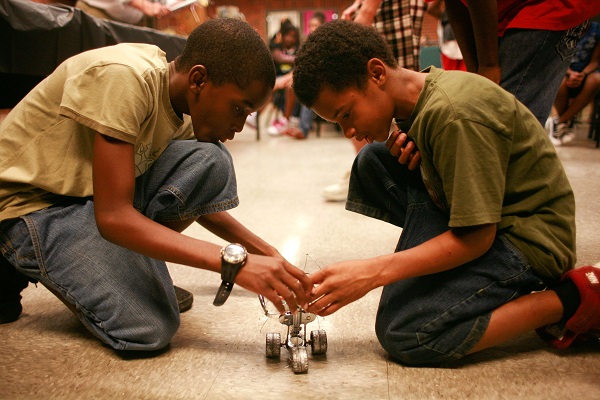
‘Learning Together’ impact study reports exciting progress for Pittsburgh’s Remake Learning
What began as an idea in Pittsburgh a decade ago to connect and support educators and others in the kids’ space, today is a sprawling initiative involving hundreds of people affecting kids in three states. It’s all about revolutionizing education and it’s called Remake Learning.
The recently released “Learning Together” impact report covers 10 years of growing Remake Learning, a collaboration of educators and innovators working to shape the future of education in the region. The hands-on approach in and out of the classroom encourages students to learn through creation and discovery, often rooted in STEAM –science, technology, engineering, arts and music — to better prepare for careers of the future. Remake Learning offers a professional network of classes, resources, and activities for schools and parents.
“Remake learning has embraced the future of learning and for different people that means different ways. For some it’s STEM-centered learning, for some it’s project-based learning,” says Gregg Behr, co-chair of the Remake Learning Council and executive director of The Grable Foundation. “We’ve not been dogmatic and said it has to be ‘this.’ ”

Remake Learning now offers programs in 30 counties of southwestern Pennsylvania, West Virginia, and eastern Ohio. Among the impact study’s findings, “Learning Together” reports:
- There are more than 170 maker spaces, which combine traditional crafts with more contemporary tools. More than 100 of these spaces are located in public schools.
- More than 60 local organizations offer professional development for teachers to show them how to integrate new approaches to learning in the classroom.
- Remake Learning brought together 34 organizations to form the Pittsburgh Regional STEM Initiative. STEM – Science, Technology, Engineering, and Mathematics – promotes a hands-on approach to educating students and getting them excited about the subjects.
- As proof that learning doesn’t stop when the end-of-day school bell rings, participation by kids in local after-school programming exceeds the national average by 10 percentage points.
Enthusiastic community support for Remake Learning includes an anonymous donor who committed $2.5 million, as well as $2 million from Chevron Appalachia. Google also has agreed to partner with Remake Learning participants to help students learn more about technology.
The idea that sparked what eventually became Remake Learning grew out of conversations Behr and others had with educators, asking how best the nonprofit could help them help students. Teachers reported they were not connecting with kids as they used to, he says.
Behr recalls early brainstorming sessions over pancakes and coffee at Pamela’s Diner in the Strip District with other nonprofit leaders and educators as they developed ideas to help.
A decade later, he says he could not have foreseen the growth.

“I want for all kids the same thing I want for my two daughters: I want them to be engaged in their learning, to experience creativity, joy, wonder, so they can see brilliant futures for themselves,” Behr says. “And I want it to be fair. I want kids from all types of backgrounds to experience this.
“This region is a learning campus for kids. As long as we remain focused on kids’ futures and support them, they will fly brilliantly.”
Excited by these new leaps in education? Read the entire study here.